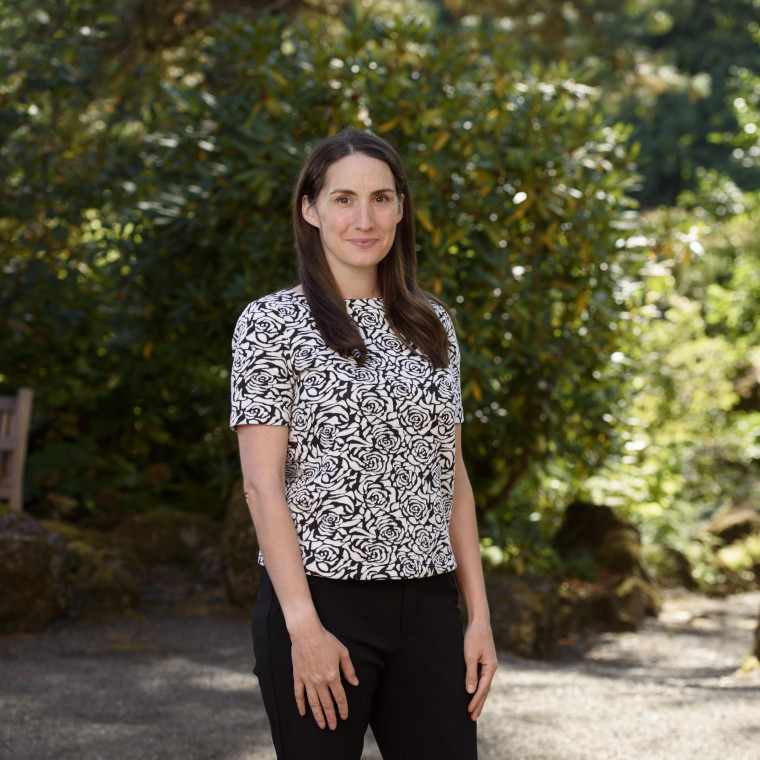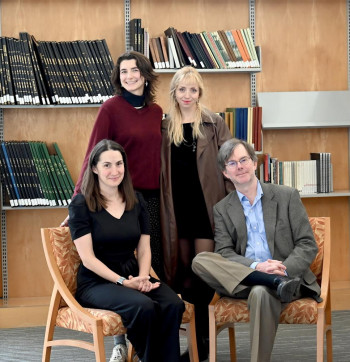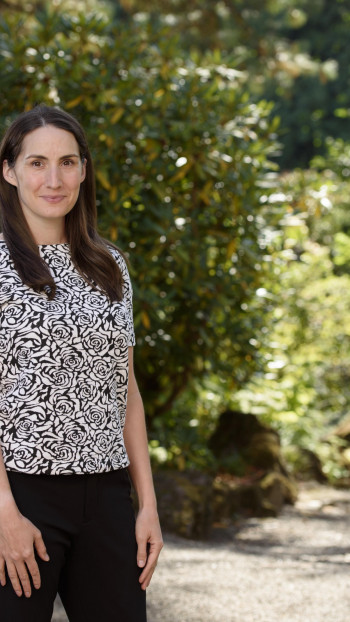Ellen Seljan
I love how appreciative Lewis & Clark students are of their own education. It is always obvious that they want to be here and that they want to learn. I love watching them grow throughout their four years here and getting to know them not just as students, but as people.

Pronouns
Title
Department(s)
What three words would you use to describe Lewis & Clark?
Humanities Summer Research, July 2023
Responses were written together with coresearcher Associate Professor of Political Science Todd Lochner.
Tell us about your summer research.
Our research investigates whether small donors (individuals who give less than $200 to a political campaign over the course of an election cycle) exacerbate political
Credit: Devan Freemanpolarization. Current research demonstrates that individual donors—as opposed to PACS or political parties—are more likely to give money to extreme candidates on both ends of the political spectrum. However, researchers are now investigating whether there are significant differences between small individual donors and large individual donors as well. Todd and I, along with two students—Madeleine MacWilliamson BA ’24 and Valerie Naborska BA ’24—are conducting an empirical analysis of campaign spending in Oregon state legislative elections to see if this is true.
How did you become interested in your research topic? What sort of real-world implications does your research have?
Todd has always been interested in campaign finance regulation and enforcement, and Ellen specializes in state and local politics. We’ve coauthored five publications together, all with student coauthors. We became interested in this particular topic given recent proposals to enhance the power of small donors by, for example, providing state matching funds for their donations. Most people assume that anything that shifts money in elections away from institutional donors such as PACS to smaller donors is an unalloyed good. Certainly there are many benefits to such proposals, but if it is true that small donors exacerbate political polarization then academics and policymakers should take such findings into consideration.
How are students involved?
Both Valerie and Madeleine are involved in every facet of the paper, from research design to data collection to compiling a literature review to analyzing the final results.
What would prospective students find most interesting about this research?
We think the issue of political polarization is relevant to everyone for obvious and unfortunate reasons. We can’t reach conclusions without gathering and analyzing our data, of course, but if current theoretical expectations prove true it would yield a very tricky problem. On the one hand we want to “democratize” money in politics, but on the other we want to avoid political extremism and its accompalying pathologies. It may turn out you can’t do both. But again, we have to wait until we see what the data says!
What do you enjoy most about collaborating with Lewis & Clark students?
Todd and I have collaborated with many students over the years, and we really love the enthusiasm, professionalism, and expertise they bring to our research. We view student-faculty research collaboration as a great way to show students exactly what it is political scientists do, and we enjoy helping students hone their social science skills.
How does Lewis & Clark/this summer research experience prepare your students for a career and/or advanced studies after graduation?
I’d let Madeleine and Valerie speak for themselves, but both are considering a career in either law or data science. This research concerns both, so not only does it help students to get a sense of what types of research they most enjoy, but also provides them a skills-based toolkit that should serve them well whatever career path they ultimately choose.
Life at L&C
How do you describe the liberal arts?
The liberal arts is a broad-based form of education, providing students with opportunities to engage in intellectual inquiry from multiple perspectives. We challenge students to make connections between diverse fields of study and champion exploration and discovery above any form of more narrow training. A liberal arts education teaches students to learn how to learn, giving you a flexible skill set that can navigate an ever-changing world.
What do you enjoy most about Lewis & Clark students?
I love how appreciative Lewis & Clark students are of their own education. It is always obvious that they want to be here and that they want to learn. I love watching them grow throughout their four years here and getting to know them not just as students, but as people. There isn’t “one” type of Lewis & Clark student, which means I’m now connected to so many diverse and amazing individuals.
How does Lewis & Clark prepare students interested in your field to pursue a career and/or advanced studies after graduation?
Studying politics is studying the way that people make decisions collectively. Understanding how one’s institutional context and individual incentives shape those decisions is invaluable in any professional setting, or even just for navigating your day-to-day life. Students that graduate from our major know how to analyze situations from multiple perspectives and how to both work together and lead.
What sets your department or program apart from other small liberal arts colleges?
Political science at Lewis & Clark has tremendous breadth for being such a small department. We teach students to think quantitatively, analytically, comparatively, and through a humanistic lens. Students will learn about how politics works globally, as well as right here in Portland. We encourage our students to apply what they learn in our classes to the many political or policy-based internship opportunities available in our city.
What should incoming students know about L&C?
Incoming students should know that our curriculum gives you plenty of room to explore majors and take classes that you find interesting, not just that fulfill graduation requirements. You’ll have plenty of opportunities for advising with faculty along the way so that you can really enjoy your education without worrying too much about navigating the system.
What’s your favorite spot on campus?
I love that, year round, I can just step outside my office and see green. The view of Mount Hood from Frank Manor House never gets old and a walk through next-door Tryon Creek State Park is instantaneously rejuvenating.
Describe your involvement with data science. What should incoming students know about this work?
In addition to being a member of the political science department, I am also the director of our data science program. We have a rapidly growing data science minor supported by faculty members across campus. Next year I’m looking forward to bringing in speakers that speak to how data science can be used for the social good. I also enjoy teaching Introduction to Data Science every spring.
Political Science Data Science
- Associate Professor Ellen Seljanwalks you through the courses you can expect to take as a political science major.

More Admissions Stories
Admissions is located in Frank Manor House on the Undergraduate Campus.
MSC: 32
email admissions@lclark.edu
voice 503-768-7040
fax 503-768-7055
Vice President of Admissions and Financial Aid
Eric Staab
Admissions
Lewis & Clark
615 S. Palatine Hill Road MSC 32
Portland OR 97219

